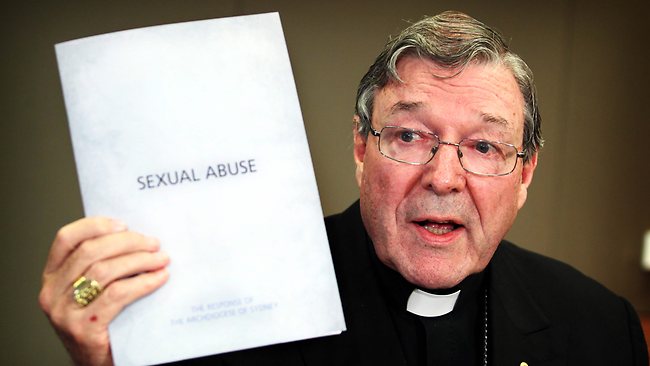Church Commits Sin of Omission
Herald Sun
THE ill-chosen words of Cardinal George Pell in defending the Catholic Church on its legal responsibilities to the many people abused by its priests will only add to their pain. In an extraordinary statement while giving evidence to the Royal Commission into Institutional Responses to Child Sexual Abuse, Cardinal Pell compared the church’s position with no more than that of a trucking company whose drivers molested hitchhikers. The comparison brought an instant rebuke from the commission’s chairman as well as a barrister representing a victim of abuse. That Cardinal Pell could contemplate such a comparison is baffling. Surely he regards priests — and he is one, as well as holding high office — as the essential core of the church and indivisible from it as an organisation. Barrister Sean Cash’s response was that far from being a trucking company, the Catholic Church was an organisation of the “highest integrity”. Cardinal Pell found fault with that. The church was not always of the highest integrity, he responded, and had “a long history of sin and criminality within the church”. Some reading this might think the former archbishop of both Melbourne and Sydney was contradicting his previous remarks. Some Australians may feel that Cardinal Pell has lost touch with the hurt and torment felt by victims of paedophile priests who have overwhelmed the royal commission by their evidence and by their numbers. Cardinal Pell was giving evidence via a video link from Rome where he occupies a senior role in overseeing the Vatican’s finances. He is obviously concerned with the cost of compensation to those abused by its priests as well as trying to draw a line in his ledger between the church and its predatory priests. In doing so, he put forward what must be regarded as the thinnest of defences to revealing communications between the Vatican and its Australian representatives. His argument against revealing such documents to the royal commission would seem to be based on the Vatican’s status as a state within a state and protected by international conventions that shield its sovereign affairs. Cardinal Pell would also seem to have been caught on the horns of a dilemma when answering questions about the compensation scheme known as the Melbourne Response. As archbishop, he had an obligation to take care of the church’s money and a responsibility to the victims. Compensation capped at $50,000 was raised to $75,000 if they relinquished any rights they might have had to civil litigation. At least Cardinal Pell agreed the church should have used “less confrontational language” than warning the vulnerable and often emotionally damaged victims of sexual abuse that their legal complaints would be “strenuously defended”. Responsibility for decades of abuse by priests cannot be so easily dismissed by the church they served. It may be that the princes of the church in Rome are not as concerned as they might be with what has happened in Australia. The Catholic Church is run like any multinational business. But it cannot escape its moral responsibilities while it might argue it is not legally accountable. In the court of public opinion the wheels have long fallen off the “truck driver” defence, in spite of the legal twists and turns its lawyers and now Cardinal Pell have put in the way of its victims. The Catholic Church has confessed and now it must do penance. It is for the royal commission to assess who is to pay and how much, not Cardinal Pell.
|
.
Any original material on these pages is copyright © BishopAccountability.org 2004. Reproduce freely with attribution.
